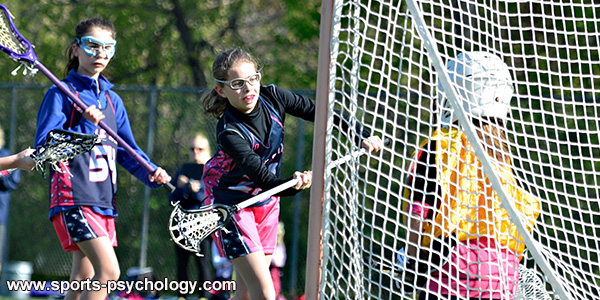Help Sports Kids Overcome Social Approval
Summary: Young athletes often struggle with confidence when they focus too much on what coaches or teammates might think of their mistakes. This pressure can lead to shaky performances and fear of failure. By helping kids identify their true worries, challenging irrational fears, and focusing on the process rather than perfection, parents and coaches can guide athletes toward a healthier mindset.
A young athlete writes:
“I am a badminton player and I am finding it really hard to not get shaky or lose confidence when in a game if I miss a shot, my coach keeps telling me that I am I good player and I should believe in myself but then I just get more worried because I know she is watching me. Please help!”
This type of confidence issue is common for sports children…
In this case, it sounds like the young athlete is experiencing fear of failure due to a need for social approval, particularly from the coach.
When sports kids are afraid of what others may say or do if their performance is not perfect, they’re seeking social approval. They want teammates and coaches to feel good about them.
When kids think others expect perfection from them, small failures are unacceptable to them. When they do mess up, they can’t take their minds off mistakes and worries about what others think.
The first thing you and your sports children need to do is identify what the child is worrying about.
Help Kids Stop Worrying About What Others Think by Asking a Few Questions:
“Does it really matter in the big picture if you miss a shot, or lose a single game?”
Question the rationality of the fear…
“Do you think your coach really expects you not to make a mistake?”
Make sure they can recognize this faulty thinking and refocus on the task of playing the game.
Next, encourage kids to focus on the process of playing. For example, tell them to focus on making great shots or being great team players.
If they can take their minds off what others think, and focus on making one shot, one at a time, they’ll feel more confident.
5 Tips to Help Young Athletes Build Confidence and Stop Worrying About Mistakes
1. Identify the Real Worry
Many kids fear letting down their coaches, parents, or teammates. Help them recognize whether their nervousness comes from fear of failure or fear of disappointing others.
2. Challenge Unrealistic Expectations
Ask questions like, “Do you think your coach really expects you to be perfect every time?” This helps athletes see that mistakes are a natural part of learning and competing.
3. Focus on the Process, Not Perfection
Encourage kids to think about one skill at a time—like footwork, timing, or aiming—rather than worrying about winning or impressing others.
4. Shift Attention to the Next Play
Teach athletes to move past mistakes by repeating simple cues such as “next shot” or “reset.” This helps them stay present instead of dwelling on errors.
Check out our latest product, “10-Minute Pregame Prep,” for more tips about boosting confidence!
Related Sports Psychology Articles:
- Maintaining Confidence After a Bad Performance
- Improving Your Confidence to Play at Your Peak
- Confidence For Preforming New Skills in Competition
Boost Your Self-Confidence With Expert Mental Game Coaching!
Expert mental game coach Dr. Patrick Cohn can help you overcome your mental game issues in sports with personal coaching. We do mental training with athletes of all levels and ages–about 12 years and up. And mental training is not just for elite or professional athletes.
You can work with us in Orlando, Florida or via Skype, FaceTime, or telephone from anywhere in the world. Call us toll free at 888-742-7225 or contact us for more information about the different coaching programs we offer
If you are interested in mental coaching, try our free 15-minute introductory session. Contact Peak Performance Sports today with your name, sport, and what mental game challenges you are having.
You can learn more about our mental coaching programs for athletes here.
FAQ: Helping Young Athletes Overcome Fear of Mistakes
Q: Why does my child get nervous when the coach is watching?
A: Many kids feel they need to prove themselves and fear losing approval. This creates extra pressure and makes mistakes feel bigger than they really are.
Q: How can I help my athlete stop overthinking mistakes?
A: Encourage them to use reset cues like “next ball” or “focus forward.” These phrases shift attention away from errors and back onto the game.
Q: Should I remind my child that winning doesn’t matter?
A: Yes—remind them that one missed shot or one lost game doesn’t define them as an athlete. Confidence grows when they understand the bigger picture.
Q: What role should coaches play in building confidence?
A: Coaches should encourage effort, progress, and resilience, rather than perfection. When athletes know mistakes are accepted, they play more freely.
Q: How can athletes build lasting confidence?
A: Confidence comes from consistent practice, focusing on controllable goals, and learning to separate performance from self-worth.
Dr. Patrick Cohn is an expert mental performance coach who has helped athletes for over 30 years enhance their performance. Dr. Cohn earned a master’s degree in sports psychology from CSUF and a Ph.D. from the University of Virginia, specializing in Applied Sports Psychology.

